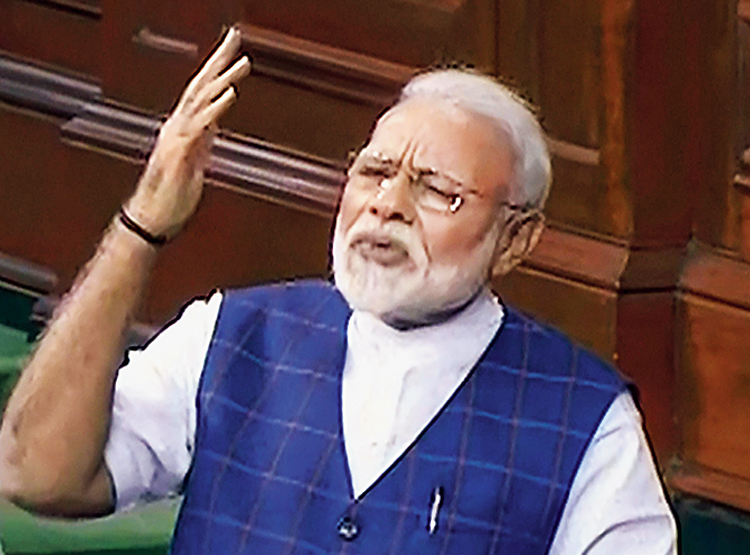Prime Minister Narendra Modi on Tuesday juggled roles as pugilist and pacifier in the Lok Sabha, capping a blistering attack on the Congress with a description of Jawaharlal Nehru as a “mahapurush (great man)” to seek the Opposition’s help to build a “New India”.
Replying to the motion of thanks to the President’s address, the Prime Minister divided his speech that went beyond an hour into three parts: withering criticism of the Congress, an iteration of the achievements of his government and generous praise for the first Prime Minister of India for showing the world that duties take precedence over rights.
Modi, who has often given the impression that he is not comfortable acknowledging the contributions of Nehru, first addressed the Opposition’s charge that he never recognises the good work of his predecessors and then built up the suspense before naming the object of his admiration.
“The biggest lesson to the world from India is that here, duties come first. From these duties emerge the rights. In today’s world, everyone talks about their rights and conveniences. Hardly anyone talks about duties. This is the reason for the friction in the world. It is true that we fight for our rights, but if we forget our duties, these rights will also not remain with us,” the Prime Minister told the Lok Sabha.
“It is our responsibility that the great man (mahapurush) who uttered these words, these were later forgotten... remembering that great man with respect, can we take this thought forward?” Modi asked, taking his time to reveal the identity of the exalted figure.
“The great man had said this on July 14, 1951, while launching the first Congress manifesto, this paragraph was said by Pandit Nehruji. I believe that the dream that Panditji saw in 1951, to fulfil that dream to take the country on the path of duties, to understand Panditji’s wish and see if we can take it forward, we can all decide together...,” Modi added, extending an olive branch to the Opposition.
Earlier, the Prime Minister had said: “So busy were they (the Congress) with delusions of soaring high that they forgot to remain rooted to the ground. They thought anyone on the ground is lowly and dirty. We have no such desire to soar. We are happy grounded, rooted and with our people.”
Modi firmly denied the charge of not crediting past governments. He said that at least on two occasions in his address to the nation from the Red Fort, he had talked about contributions of all governments since Independence and he charged the Congress with not giving credit to anyone outside the family.
“I challenge you that between 2004 and 2014 of the UPA government not once did you take Atal Bihari Vajpayee’s name and acknowledge his contribution,” he said. “Leave apart Atal, you did not even credit your own Narasimha Rao. In this Lok Sabha, you don’t even take the name of Manmohan Singh…. Outside the family, people get nothing,” Modi added.
Sonia and Rahul Gandhi were present in the House and they sat quietly.
Modi pointed out how his government had given Bharat Ratna to Pranab Mukherjee, ignoring his political background.
Appearing angry, Modi said that he was being falsely accused repeatedly and added that it should stop. “Thus far and no further…. We don’t negate anybody’s contribution,” he said.
Modi then referred to the Emergency, whose anniversary fell on Tuesday. “On the night of June 25, the country’s soul was crushed,” he said.
Modi said democracy was the soul of the country for centuries and it was crushed only to save someone’s chair.










